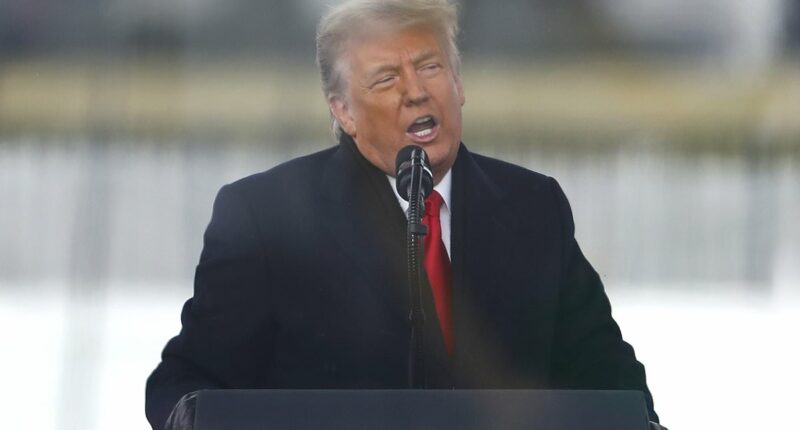Share this @internewscast.com
In a significant move that has stirred political waters, former President Donald Trump has granted pardons to Rudy Giuliani and several other Republicans. These individuals were involved in efforts to contest the outcome of the 2020 presidential election.
The announcement came to light on Sunday, following a statement by Trump’s pardon attorney, Ed Martin, who disclosed that the pardon had been signed on Friday.
The pardoning document described the action as a step towards rectifying what it termed a “grave national injustice” that followed the contentious 2020 election. It emphasized the goal of fostering national reconciliation.
Importantly, the pardon explicitly excludes Trump himself, leaving him outside the scope of this legal reprieve.
Charges had been filed by Democratic state attorneys general against individuals they accused of acting as “fake electors.” These individuals allegedly signed documents claiming Trump had won the presidential race in their respective states, despite the official results.
The allegations suggested a strategy where then-Vice President Mike Pence would have been urged to certify electoral votes in favor of Trump, disregarding the actual victory of Joe Biden in the Electoral College.
When Pence then refused to do so, a mob of Trump supporters stormed the Capitol on January 6, 2021.
Trump’s pardon came as attorneys general in Arizona, Georgia, Michigan, Nevada and Wisconsin faced looming deadlines in their cases.

President Donald Trump has pardoned Republicans for trying to overturn the results of the 2020 Presidential Election

Trump’s former personal lawyer Rudy Giuliani was among those who were pardoned

Prosecutors argued that Trump allies had conspired to get Vice President Mike Pence to declare certain states for the then-president, and when he didn’t, some of Trump’s supporters stormed the Capitol
In Arizona, for example, Attorney General Kris Mayes faced a decision on whether to press forward with her case or let it fizzle out after a state judge in May ordered prosecutors to return the case to a grand jury, The Hill reports.
A group of politicians and party leaders there argued that prosecutors failed to present to a grand jury a century-old law they claimed excused their decision to send Republican electoral votes to Congress despite Biden’s victory in the state, according to the Courthouse News Service.
Maricopa County Jude Sam Myers agreed, ruing ‘a prosecutor has a duty to instruct the grand jury on all law applicable to the facts of the case.’
By omitting mention of the law Republicans said justified their actions, Myers ruled that the defendants – who included Giuliani, former White House Chief of Staff Mark Meadows and campaign advisor Boris Epshteyn – were ‘denied a substantial procedural right.’
Meanwhile, in Michigan, a state judge dismissed charges faced by 15 pro-Trump electors in September after finding insufficient evidence to prove criminal intent.
District Court Judge Kristen Simmons, who was appointed to the court by Democratic Governor Gretchen Whitmer, ruled that the Republican defendants ‘seriously believed’ there was fraud in the 2020 presidential election.
‘I believe they were executing their constitutional right to seek redress,’ she wrote in her decision.
‘Right, wrong or indifferent, it was these individuals and many other individuals in the state of Michigan that sincerely believed that for some reason there were some serious irregularities with the election.’

Giuliani had been facing charges in Arizona for falsely signing documents saying Trump had won the election in the state, but the case was transferred back to a grand jury in May

Michigan District Court Judge Kristen Simmons dismissed charges faced by 15 pro-Trump electors in September after finding insufficient evidence to prove criminal intent
All the defendants, which included former Michigan GOP co-chair Meshawn Maddock, maintained their innocence throughout the trial.
Prosecutors during the initial indictment dropped charges against a 16th individual after the defendant agreed to cooperate with the attorney general’s office.
During her ruling, Simmons said the defendants lacked the ‘sophistication’ to carry out the crimes outlined by the prosecution.
‘The prosecution would like the court to believe that these named defendants were savvy or sophisticated enough to understand fully the electoral process, which the court does disagree because the document that was presented doesn’t even align with the level of sophistication that they want me to believe,’ Simmons added.
After Simmons’ brutal dismissal, the state attorney general stood by the case, claiming the defendants ‘knew they lied.’
‘The evidence was clear: They lied. They knew they lied, and they tried to steal the votes of millions of Michiganders,’ Attorney General Dana Nessel said while leaving the courthouse.
‘And if they can get away with this, well, what can they get away with next?’

In Georgia, Fulton County District Attorney Fani Willis’s office was disqualified from prosecuting Trump allies after her affair with special prosecutor Nathan Wade, a member of her team, helped blow up the case
In Georgia, prosecutors also faced an uphill battle trying to convict Trump allies of falsifying election results after Fulton County District Attorney Fani Willis’s office was disqualified over her relationship with one of the prosecutors.
This is a breaking news story and will be updated.

















